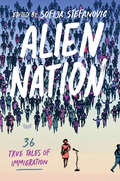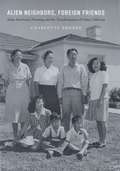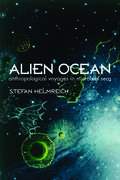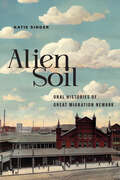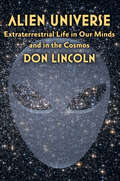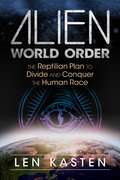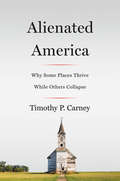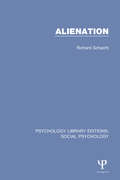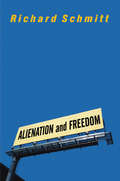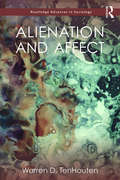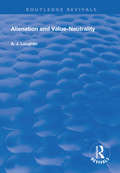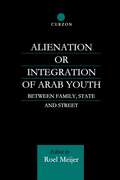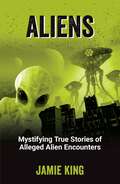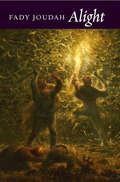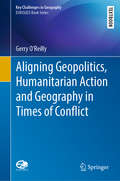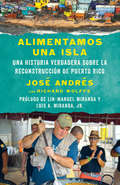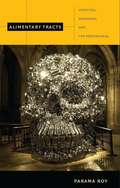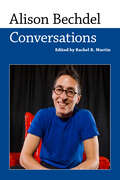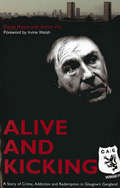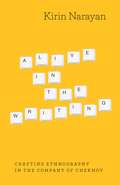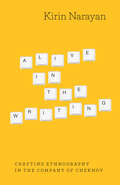- Table View
- List View
Alien Nation: 36 True Tales of Immigration
by Sofija StefanovicA collection of 36 extraordinary stories originally told on stage, featuring work by writers, entertainers, thinkers, and community leaders. Spanning comedy and tragedy, Alien Nation brilliantly illuminates what it’s like to be an immigrant in America.America would not be America without its immigrants. This anthology, adapted from storytelling event “This Alien Nation,” captures firsthand the past and present of immigration in all its humor, pain, and weirdness. Contributors—some well-known, others regular (and fascinating) people—share moments from their lives, reminding us that immigration is not just a word dropped in the news (simplified to something you are “for” or “against”), but a world—rich with unique voices, perspectives, and experiences. Travel from the Central Park playground where “tattle-tales” among nannies inspire Christine Lewis’s activism to an Alexandrian garden half a century ago courtesy of writer André Aciman. Visit a refugee camp in Gaza as described by actress and comedian Maysoon Zayid, and follow Intersex activist Tatenda Ngwaru as she flees Zimbabwe with dreams of meeting Oprah. Witness efforts from comedian Aparna Nancherla's mother to make Aparna less shy, and Orange is the New Black's Laura Gómez makes an unlikely connection in a bed-and-breakfast. Compelling and inspirational, Alien Nation is a celebration of immigration and an exploration of culture shock, isolation and community, loneliness and hope, heartbreak and promise—it’s a poignant reminder of our shared humanity at a time we need it greatly, and a thoughtful, entertaining tribute to cultural diversity.
Alien Neighbors, Foreign Friends: Asian Americans, Housing, And The Transformation Of Urban California
by Charlotte BrooksBetween the early 1900s and the late 1950s, the attitudes of white Californians toward their Asian American neighbors evolved from outright hostility to relative acceptance. Charlotte Brooks examines this transformation through the lens of California’s urban housing markets, arguing that the perceived foreignness of Asian Americans, which initially stranded them in segregated areas, eventually facilitated their integration into neighborhoods that rejected other minorities. <p><p> Against the backdrop of cold war efforts to win Asian hearts and minds, whites who saw little difference between Asians and Asian Americans increasingly advocated the latter group’s access to middle-class life and the residential areas that went with it. But as they transformed Asian Americans into a “model minority,” whites purposefully ignored the long backstory of Chinese and Japanese Americans’ early and largely failed attempts to participate in public and private housing programs. As Brooks tells this multifaceted story, she draws on a broad range of sources in multiple languages, giving voice to an array of community leaders, journalists, activists, and homeowners—and insightfully conveying the complexity of racialized housing in a multiracial society.
Alien Ocean: Anthropological Voyages in Microbial Seas
by Stefan HelmreichAlien Ocean immerses readers in worlds being newly explored by marine biologists, worlds usually out of sight and reach: the deep sea, the microscopic realm, and oceans beyond national boundaries. Working alongside scientists at sea and in labs in Monterey Bay, Hawai'i, the Woods Hole Oceanographic Institution, and the Sargasso Sea and at undersea volcanoes in the eastern Pacific, Stefan Helmreich charts how revolutions in genomics, bioinformatics, and remote sensing have pressed marine biologists to see the sea as animated by its smallest inhabitants: marine microbes. Thriving in astonishingly extreme conditions, such microbes have become key figures in scientific and public debates about the origin of life, climate change, biotechnology, and even the possibility of life on other worlds.
Alien Soil: Oral Histories of Great Migration Newark (CERES: Rutgers Studies in History)
by Katie SingerAlien Soil: Oral Histories of Great Migration Newark explores Newark’s Krueger-Scott African-American Cultural Center collection of over 100 oral histories. Historian Katie Singer separates these stories into thematic categories of social and political events, including church, work, and activism, in order to paint an intimate portrait of everyday urbanity and the larger Black urban experience in Newark. Through the examination of these Krueger-Scott narratives, Singer challenges historical falsehoods with the lived experiences of Newarkers who traveled North during the Great Migration, as well as established city residents. Alien Soil effectively contextualizes Newark history and re-inserts Black voices into historiography traditionally dominated by “outsiders." The book begins with the Krueger-Scott Mansion’s deep history, followed by the sequence of events surrounding the proposed Cultural Center. Last owned by African-American millionaire and beauty-culture entrepreneur Louise Scott, the Victorian Krueger-Scott Mansion was built by beer baron Gottfried Krueger in 1888. Through the history of the Mansion, and the ultimately failed Cultural Center project, one learns about the Newark that African Americans migrated to, what they found when they got there, how living in the city changed them, and how they, individually and collectively, changed Newark. After the Cultural Center project was officially halted in 2000, the cassette tapes of the oral history interviews were stored away at the Newark Public Library. Ten years later they were unearthed, and ultimately digitized. As of yet, no one has applied these sources directly to their research. Deeply committed to these rich, insightful stories, Singer calls for a more thoughtful consideration of all cities, reminding us that Newark is much more than its 1967 rebellion.
Alien Universe: Extraterrestrial Life in Our Minds and in the Cosmos
by Don LincolnAre alien civilizations really possible?If extraterrestrials exist, where are they? How likely is it that somewhere in the universe an Earth-like planet supports an advanced culture? Why do so many people claim to have encountered Aliens? In this gripping exploration, scientist Don Lincoln exposes and explains the truths about the belief in and the search for life on other planets.In the first half of Alien Universe, Lincoln looks to Western civilization's collective image of Aliens, showing how our perceptions of extraterrestrials have evolved over time. The roots of this belief can be traced as far back as our earliest recognition of other planets in the universe—the idea of them supporting life was a natural progression of thinking that has fascinated us ever since. Our captivation with Aliens has, however, led to mixed results. The world was fooled in the nineteenth century during the Great Moon Hoax of 1835, and many people misunderstood Orson Welles's 1938 radio broadcast, The War of the Worlds, leading to significant anxiety among some listeners. Our continuing interest in Aliens is reflected in entertainment successes such as E.T., The X-Files, and Star Trek.The second half of the book explores the scientific possibility of whether advanced Alien civilizations do exist. For many years, researchers have sought to answer Enrico Fermi’s great paradox—if there are so many planets in the universe and there is a high probability that many of those can support life, then why have we not actually encountered any Aliens? Lincoln describes how modern science teaches us what is possible and what is not in our search for extraterrestrial civilizations.Whether you are drawn to the psychological belief in Aliens, the history of our interest in life on other planets, or the scientific possibility of Alien existence, Alien Universe is sure to hold you spellbound.
Alien World Order: The Reptilian Plan to Divide and Conquer the Human Race
by Len KastenShares new documents to expose the sinister alien influence in world governments, financial systems, and scientific institutions throughout history• Shows how Eisenhower’s treaty with the Greys, signed at Holloman Air Force Base in 1954, gave the aliens authority to abduct humans for "research"• Reveals how Reptilian-influenced ex-Nazis infiltrated the U.S. government• Explains how the Reptilians have created alien-human hybrids under their control to replace the human populationLong ago, the Galactic Federation sent the Atlans, a fierce group of humans from the Pleiades, to Earth to confront the newest colony of the combative ever-spreading alien race known as the Reptilians. The ensuing battle sank the continent of Lemuria and drove the Reptilians underground beneath the Indian subcontinent as well as to Antarctica. Able to shapeshift to appear human, the Reptilians then infiltrated the Atlantean civilization, abducting humans and creating Reptilian hybrids. As Len Kasten shows, this technique of infiltration and hybridization prior to an all-out attack has been the hallmark of Reptilian conquest throughout the galaxy.Chronicling the history of the Reptilian Empire’s influence on Earth and their conquest of 21 star systems, Kasten reveals how the human race is enmeshed in a skillfully concealed plot to enslave humanity and exploit our planet’s physical and biological resources. Revealing Hitler’s pact with extraterrestrials and the Reptilian influence on the Nazi state, he shares new documents that disclose the rescue and rehabilitation of Nazi war criminals to assist in the Cold War, which then corrupted many U.S. government institutions. Focusing on crucial events in the decade after World War II, he examines the Reptilians’ human allies, the Illuminati, who control the levers of financial, technological, and military power throughout the world through various secret societies. He shows how Eisenhower’s treaty with the Greys, signed at Holloman Air Force Base in 1954, gave the aliens permission to take humans up to their spaceships, ostensibly for genetic study--in return for alien technology--and how these abductions led to the creation of a hybrid race under Reptilian mind control. He also explains how Kennedy was assassinated by the CIA because of his plans to rout out this Nazi–Reptilian presence.Contrasting the Reptilians with the benevolent Ebens, the aliens from Zeta Reticuli who crashed at Roswell, Kasten exposes the stealthy tactics of the Reptilians, their relationship with the Greys, and their advanced genetic bio-technology and teleportation abilities--as well as what we need to do to defeat their plans.
Alienated America: Why Some Places Thrive While Others Collapse
by Timothy P CarneyRespected conservative journalist and commentator Timothy P. Carney continues the conversation begun with Hillbilly Elegy and the classic Bowling Alone in this hard-hitting analysis that identifies the true factor behind the decline of the American dream: it is not purely the result of economics as the left claims, but the collapse of the institutions that made us successful, including marriage, church, and civic life.During the 2016 presidential campaign, Donald J. Trump proclaimed, “the American dream is dead,” and this message resonated across the country. Why do so many people believe that the American dream is no longer within reach? Growing inequality, stubborn pockets of immobility, rising rates of deadly addiction, the increasing and troubling fact that where you start determines where you end up, heightening political strife—these are the disturbing realities threatening ordinary American lives today.The standard accounts pointed to economic problems among the working class, but the root was a cultural collapse: While the educated and wealthy elites still enjoy strong communities, most blue-collar Americans lack strong communities and institutions that bind them to their neighbors. And outside of the elites, the central American institution has been religionThat is, it’s not the factory closings that have torn us apart; it’s the church closings. The dissolution of our most cherished institutions—nuclear families, places of worship, civic organizations—has not only divided us, but eroded our sense of worth, belief in opportunity, and connection to one another.In Abandoned America, Carney visits all corners of America, from the dim country bars of Southwestern Pennsylvania., to the bustling Mormon wards of Salt Lake City, and explains the most important data and research to demonstrate how the social connection is the great divide in America. He shows that Trump’s surprising victory was the most visible symptom of this deep-seated problem. In addition to his detailed exploration of how a range of societal changes have, in tandem, damaged us, Carney provides a framework that will lead us back out of a lonely, modern wilderness.
Alienation
by Frederick Neuhouser Alan E. Smith Rahel JaeggiThe Hegelian-Marxist idea of alienation fell out of favor during the post-metaphysical rejection of humanism and essentialist views of human nature. In this book Jaeggi draws on phenomenological analyses grounded in modern conceptions of agency, along with recent work in the analytical tradition, to reconceive of alienation as the absence of a meaningful relationship to oneself and others, which manifests itself in feelings of helplessness and the despondent acceptance of ossified social roles and expectations.A revived approach to alienation helps critical social theory engage with phenomena, such as meaninglessness, isolation, and indifference, which have broad implications for issues of justice. By severing alienation's link to a problematic conception of human essence while retaining its social-philosophical content, Jaeggi provides resources for a renewed critique of social pathologies, a much-neglected concern in contemporary liberal political philosophy. Her work revisits the arguments of Rousseau, Hegel, Kierkegaard, and Heidegger, placing them in dialogue with Thomas Nagel, Bernard Williams, and Charles Taylor.
Alienation
by Frederick Neuhouser Alan E. Smith Rahel JaeggiThe Hegelian-Marxist idea of alienation fell out of favor during the post-metaphysical rejection of humanism and essentialist views of human nature. In this book Jaeggi draws on phenomenological analyses grounded in modern conceptions of agency, along with recent work in the analytical tradition, to reconceive of alienation as the absence of a meaningful relationship to oneself and others, which manifests itself in feelings of helplessness and the despondent acceptance of ossified social roles and expectations.A revived approach to alienation helps critical social theory engage with phenomena, such as meaninglessness, isolation, and indifference, which have broad implications for issues of justice. By severing alienation's link to a problematic conception of human essence while retaining its social-philosophical content, Jaeggi provides resources for a renewed critique of social pathologies, a much-neglected concern in contemporary liberal political philosophy. Her work revisits the arguments of Rousseau, Hegel, Kierkegaard, and Heidegger, placing them in dialogue with Thomas Nagel, Bernard Williams, and Charles Taylor.
Alienation (New Directions in Critical Theory #4)
by Rahel JaeggiThe Hegelian-Marxist idea of alienation fell out of favor after the postmetaphysical rejection of humanism and essentialist views of human nature. In this book Rahel Jaeggi draws on the Hegelian philosophical tradition, phenomenological analyses grounded in modern conceptions of agency, and recent work in the analytical tradition to reconceive alienation as the absence of a meaningful relationship to oneself and others, which manifests in feelings of helplessness and the despondent acceptance of ossified social roles and expectations.A revived approach to alienation helps critical social theory engage with phenomena such as meaninglessness, isolation, and indifference. By severing alienation's link to a problematic conception of human essence while retaining its social-philosophical content, Jaeggi provides resources for a renewed critique of social pathologies, a much-neglected concern in contemporary liberal political philosophy. Her work revisits the arguments of Rousseau, Hegel, Kierkegaard, and Heidegger, placing them in dialogue with Thomas Nagel, Bernard Williams, and Charles Taylor.
Alienation (Psychology Library Editions: Social Psychology)
by Richard SchachtFirst published in 1970, original blurb: ‘Alienation’ is the catchword of our time. It has been applied to everything from the new politics to the anti-heroes of today’s films. But what does it mean to say that someone is alienated? Is alienation a state of mind, or a relationship? If modern man is indeed alienated, is it from his work, his government, his society, or himself – or from all of these? Richard Schacht, in this intelligent analysis, gets to the root of these questions. Examining the concept of alienation in the works of Hegel and Marx, he gives a clear account of the origins of the modern usage of the term. Among the many insights to be gained from this analysis is a clear understanding of Hegel’s influence on Marx in this most crucial area. Mr Schacht goes on to discuss the concept of alienation in recent philosophical and sociological literature, particularly in the writings of Erich Fromm. Here he finds a great deal of confusion, which has resulted in a series of almost universally unquestioned misconceptions. This, then, is a book for all of us who use – and mis-use – the term ‘alienation’, and who are interested in the concepts it brings to mind. The arguments of Professor Walter Kaufmann’s introductory essay provide a useful background for Mr Schacht’s analysis. In this essay, Professor Kaufmann states that ‘henceforth nobody should write about alienation without first reading Schacht’s book.’
Alienation And Freedom
by Richard SchmittDrawing from existentialism, feminism, the thought of Karl Marx and novelists like Dostoevsky, Richard Schmitt looks at modern capitalist societies to understand what it is that might be wrong for individuals. His concern focuses specifically on those who are alienated-- those persons who have difficulty finding meaning in their lives, who lack confidence in themselves and trust in others and, finally, who are constantly distracted by consumer society. He explores how and why alienation occurs. From friendship, love, and work, Alienation and Freedom touches on issues meaningful to us all.
Alienation and Affect (Routledge Advances in Sociology)
by Warren D. TenHoutenAlienation has objective, social-structural determinants, yet is experienced subjectively as a psychological state involving both emotion and cognition. Part I considers conceptualizations of alienation and affect in historical context, emphasizing Rousseau, Hegel, Marx, Simmel, and Weber. Part II develops a theory of the affective bases of Seeman’s original five varieties of alienation – normlessness, meaninglessness, self-estrangement, cultural estrangement, and powerlessness. The book argues that both normlessness and cultural estrangement manifest in two distinct forms and involve distinct emotions. Thus it develops the affective bases of seven distinct varieties of alienation. This work synthesizes classical and contemporary alienation theory and the sociology of emotions. It contributes to political sociology, and finds application in social psychiatry and related health and social-service fields that treat traumatized and highly alienated individuals.
Alienation and Value-Neutrality (Routledge Revivals)
by A.J LoughlinFirst published in 1998, Loughlin examines the conception of rationality through the gazes of science, philosophy and political philosophy to further explain the concept of rational reasoning, the effects it has on the development on natural and social science and its implications on how we think about morals and politics.
Alienation or Integration of Arab Youth: Between Family, State and Street
by Roel MeijerAn anthology of contributions from eleven renowned specialists in the field who deal with topics that effect Arab youth in the Middle East the most, such as demographic growth, rising unemployment, and the difficult prospects of their future. Apart from studies on violence and youth in the Algerian civil war, the book offers new insights into generational conflicts and attempts by contemporary youth to overcome their alienation by creating their own eclectic cultural solutions to the problems of tradition and modernity. The book is based on the latest research and opinion surveys held in different Arab countries.
Aliens: Mystifying True Stories of Alleged Alien Encounters
by Jamie KingThis intriguing anthology examines incidents that were so puzzling they led witnesses to draw one inevitable conclusion: that aliens really do exist. Inside you will discover some of the most mysterious reports of UFO sightings, close encounters and alien abductions from across the globe.
Aliens: Mystifying True Stories of Alleged Alien Encounters
by Jamie KingThis intriguing anthology examines incidents that were so puzzling they led witnesses to draw one inevitable conclusion: that aliens really do exist. Inside you will discover some of the most mysterious reports of UFO sightings, close encounters and alien abductions from across the globe.
Alight
by Fady JoudahThe poems in Alight alternate between the estranging familial and strangely familiar, between burning and illumination. As father, husband, and physician, Fady Joudah gives children and vulnerable others voice in this hauntingly lyrical collection, where, with quiet ferociousness, one's self can be reclaimed from suffering's grip over mind and spirit.Fady Joudah is a Palestinian-American poet, translator, and physician of internal medicine. He received his medical training from the Medical College of Georgia and University of Texas, and served with Doctors Without Borders in 2002 and 2005. His first book, The Earth in the Attic, won the 2007 Yale Series of Younger Poets competition, judged by Louise Glück. In 2010 he received a PEN translation award for his translations of Palestinian poet Mahmoud Darwish.
Aligning Geopolitics, Humanitarian Action and Geography in Times of Conflict (Key Challenges in Geography)
by Gerry O'ReillyThis textbook offers valuable insights into the nexus between geography, geopolitics, and humanitarian action. It elucidates concepts regarding conflict and power, as well as the role of the state and the international community in mitigating and preventing violence and war. Here the material and non-material, existential or imagined reasons for conflict are deconstructed, ranging from land and resource grabs to Utopian ideals that can degenerate into dystopias, as with Daesh’s caliphate in Syria and Iraq. In turn, the issues discussed range from the local to wider national and global levels, as do their resolution mechanisms. Due to insecurities, the impacts of globalization, divisive nationalistic and isolationist reactions emerging in some democracies including the USA, the UK’s Brexit stress, and the ominous rise of populist parties across continental Europe (from France and the Netherlands to the Visegrád Group, the Balkans, and Greece), citizen fatigue has become increasingly evident, reflected in ever-growing socio-political malaise and violence.As the impact of any humanitarian disaster is proportional to the level of development of the area affected, concepts and categories of humanitarian action are explored, along with development issues at their core, especially in the Global South. Broadly speaking, humanitarian disasters fall into the categories of natural, human-made, technological, or complex; here, however, the focus is on human-made crises. Attempts at greater regulation, national and international organization and multilateralism to prevent violent conflicts, as well as enhanced responses to humanitarian emergencies, need to be supported now more than ever before.This textbook will appeal to graduate and upper undergraduate students and practitioners in the fields of geography, geopolitics, humanitarian action and geographies of conflict and war. In addition to the main content, it includes exercises, questions and sections for autonomous student learning.
Alimentamos una isla: Una historia verdadera sobre la reconstrucción de Puerto Rico
by Richard Wolffe José AndrésLa verdadera historia de cómo un grupo de chefs alimentó a cientos de miles de estadounidenses hambrientos después del huracán María y conmovió los corazones de muchos más.El chef José Andrés llegó a Puerto Rico cuatro días después de que el huracán María azotara la isla. La economía quedó destruida y para la mayoría de las personas no había agua limpia, ni alimentos, ni energía, ni gas, ni forma de comunicarse con el mundo exterior.Andrés abordó la crisis humanitaria de la única manera en que sabía que podía hacerlo: alimentando a las personas, una comida caliente a la vez. Desde servir sancocho con su amigo José Enrique en el devastado restaurante de Enrique en San Juan, hasta cocinar 100,000 comidas al día en más de una docena de cocinas en toda la isla, Andrés y su equipo alimentaron a cientos de miles de personas. Al mismo tiempo, también enfrentaron una crisis con raíces profundas, así como el sistema roto y derrochador que ayuda a mantener económicanmente a algunas de las organizaciones benéficas y ONGs más grandes.Basándose en la perspectiva de Andrés, así como en reuniones, mensajes y conversaciones que tuvo durante su estadía en Puerto Rico, Alimentamos a una isla describe de manera conmovedora cómo una red de cocinas comunitarias logró realizar un verdadero cambio, y cuenta una extraordinaria historia de esperanza ante los desastres, tanto los naturales y como aquellos causados por el ser humano.
Alimentary Tracts: Appetites, Aversions, and the Postcolonial
by Parama RoyIn Alimentary Tracts Parama Roy argues that who eats and with whom, who starves, and what is rejected as food are questions fundamental to empire, decolonization, and globalization. In crucial ways, she suggests, colonialism reconfigured the sensorium of colonizer and colonized, generating novel experiences of desire, taste, and appetite as well as new technologies of the embodied self. For colonizers, Indian nationalists, diasporic persons, and others in the colonial and postcolonial world orders, the alimentary tract functioned as an important corporeal, psychoaffective, and ethicopolitical contact zone, in which questions of identification, desire, difference, and responsibility were staged. Interpreting texts that have addressed cooking, dining, taste, hungers, excesses, and aversions in South Asia and its diaspora since the mid-nineteenth century, Roy relates historical events and literary figures to tropes of disgust, abstention, dearth, and appetite. She analyzes the fears of pollution and deprivation conveyed in British accounts of the so-called Mutiny of 1857, complicates understandings of Mohandas K. Gandhi's vegetarianism, examines the "famine fictions" of the novelist-actor Mahasweta Devi, and reflects on the diasporic cookbooks and screen performances of Madhur Jaffrey. This account of richly visceral global modernity furnishes readers with a new idiom for understanding historical action and cultural transformation.
Alison Bechdel: Conversations (Conversations with Comic Artists Series)
by Rachel R. MartinDue to the huge success of her graphic memoir Fun Home: A Family Tragicomic in 2006 and its subsequent Tony Award–winning musical adaptation in 2009, Alison Bechdel (b. 1960) has recently become a household name. However, Bechdel, who has won numerous awards including a MacArthur Fellowship, has been writing and drawing comics since the early 1980s. Her comic strip Dykes to Watch Out For (DTWOF) stood out as one of the first to depict lesbians in popular culture and is widely hailed as an essential LGBTQ resource. It is also from this comic strip that the wildly popular Bechdel Test—a test to gauge positive female representation in film—obtained its name. While DTWOF secured Bechdel’s role in the comics world and queer community long before her mainstream success, Bechdel now experiences notoriety that few comics artists ever achieve and that women cartoonists have never attained.Spanning from 1990 to 2017, Alison Bechdel: Conversations collects twelve interviews that illustrate how Bechdel uses her own life, relationships, and contemporary events to expose the world to what she has referred to as the “fringes of acceptability”—the comics genre as well as queer culture and identity. These interviews reveal her intentionality in the use of characters, plots, structure, and cartooning to draw her readers toward disrupting the status quo.Starting with her earliest interviews on public access television and in little-known comics and queer presses, Rachel R. Martin traces Bechdel’s career from her days with DTWOF to her popularity with Fun Home and Are You My Mother? This volume includes her “one-off” DTWOF strips from November 2016 and March 2017 (not anthologized anywhere else) and in-depth discussions of her laborious creative process as well as upcoming projects.
Alive and Kicking: A Story of Crime, Addiction and Redemption in Glasgow's Gangland
by David BryceFrom running with the infamous Calton Tongs to running Calton Athletic, David Bryce's life story is a remarkable account of crime, violence, alcoholism and drug addiction in Glasgow's gangland.A respected 'hard man', Bryce worked his way through most of HM's prisons in Scotland before an epiphany in 1977 made him realise that he was a hopeless alcoholic who needed help. A five-year battle followed, during which he sank into the abyss of heroin addiction before finally getting clean. In 1985, in an effort to help others who were struggling against substance abuse, Bryce set up Calton Athletic, a football team and social group made up solely of recovering drug addicts. Reformed gangster Jimmy Boyle was one of the first to have faith in Bryce and Calton Athletic, but the club eventually won widespread respect. Gordon Brown, then a young MP, was so impressed that he wrote an article for The Observer which led to a TV film starring Lenny Henry and Robbie Coltrane. In the '90s, Ewan McGregor, Irvine Welsh and the Trainspotting crew sought Bryce's advice and friendship during the making of the internationally acclaimed cult film, while Robbie Williams begged to switch nationality and play for Calton Atheltic in an 'England v. Scotland' celebrity charity match.Bryce's uncompromising belief that the only way to come off drugs is to go cold turkey and stay completely clean saw him clash with government agencies over the 'harm-reduction' policy of recent years. The club's statutory funding was withdrawn in 1998, but today Calton Athletic are still providing an invaluable lifeline while the 'official' drugs policy has become increasingly discredited.Alive and Kicking is an inspirational tale of survival and success against the odds.
Alive in the Writing: Crafting Ethnography in the Company of Chekhov
by Kirin NarayanAnton Chekhov is revered as a boldly innovative playwright and short story writer—but he wrote more than just plays and stories. In Alive in the Writing—an intriguing hybrid of writing guide, biography, and literary analysis—anthropologist and novelist Kirin Narayan introduces readers to some other sides of Chekhov: his pithy, witty observations on the writing process, his life as a writer through accounts by his friends, family, and lovers, and his venture into nonfiction through his book Sakhalin Island. By closely attending to the people who lived under the appalling conditions of the Russian penal colony on Sakhalin, Chekhov showed how empirical details combined with a literary flair can bring readers face to face with distant, different lives, enlarging a sense of human responsibility. Highlighting this balance of the empirical and the literary, Narayan calls on Chekhov to bring new energy to the writing of ethnography and creative nonfiction alike. Weaving together selections from writing by and about him with examples from other talented ethnographers and memoirists, she offers practical exercises and advice on topics such as story, theory, place, person, voice, and self. A new and lively exploration of ethnography, Alive in the Writing shows how the genre’s attentive, sustained connection with the lives of others can become a powerful tool for any writer.
Alive in the Writing: Crafting Ethnography in the Company of Chekhov
by Kirin NarayanAnton Chekhov is revered as a boldly innovative playwright and short story writer—but he wrote more than just plays and stories. In Alive in the Writing—an intriguing hybrid of writing guide, biography, and literary analysis—anthropologist and novelist Kirin Narayan introduces readers to some other sides of Chekhov: his pithy, witty observations on the writing process, his life as a writer through accounts by his friends, family, and lovers, and his venture into nonfiction through his book Sakhalin Island. By closely attending to the people who lived under the appalling conditions of the Russian penal colony on Sakhalin, Chekhov showed how empirical details combined with a literary flair can bring readers face to face with distant, different lives, enlarging a sense of human responsibility. Highlighting this balance of the empirical and the literary, Narayan calls on Chekhov to bring new energy to the writing of ethnography and creative nonfiction alike. Weaving together selections from writing by and about him with examples from other talented ethnographers and memoirists, she offers practical exercises and advice on topics such as story, theory, place, person, voice, and self. A new and lively exploration of ethnography, Alive in the Writing shows how the genre’s attentive, sustained connection with the lives of others can become a powerful tool for any writer.
